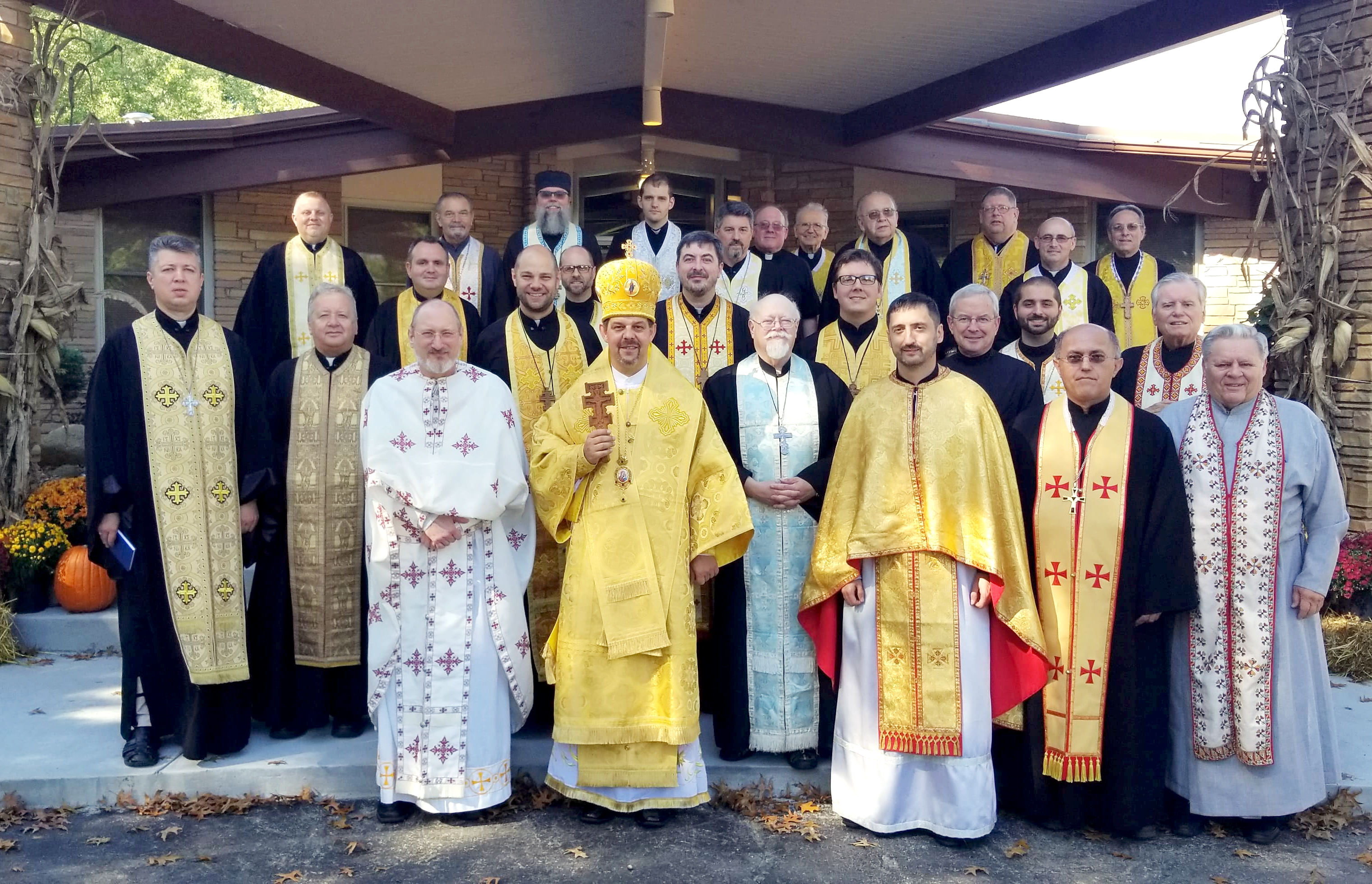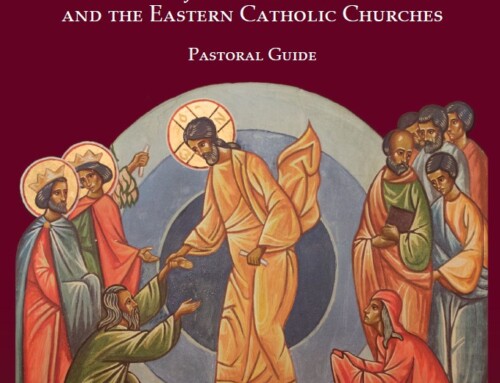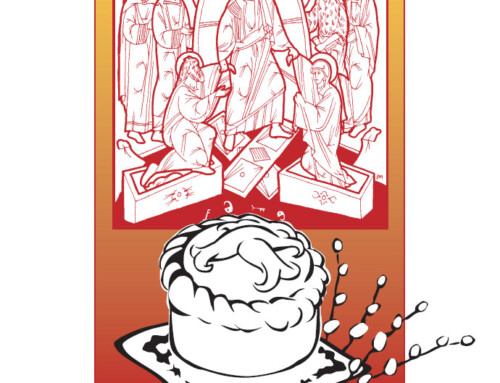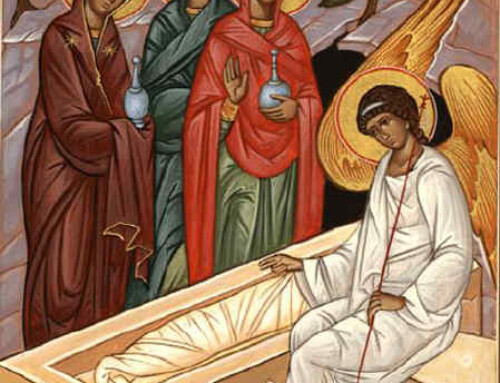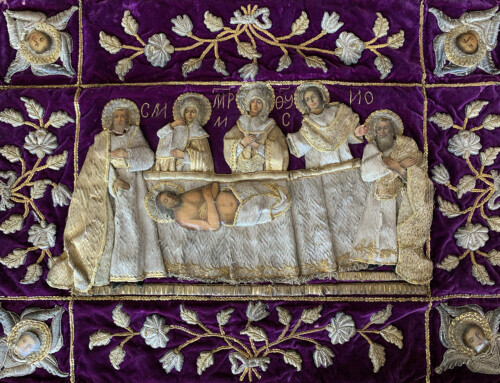The clergy of the Ukrainian Catholic Eparchy of St. Josaphat in Parma held their annual retreat on October 9-12, 2018 at the Loyola Retreat House in Clinton, Ohio.
The retreat was led this year by Very Rev. Richard Janowicz, Protosyncellus of the Ukrainian Catholic Eparchy of St. Nicholas in Chicago and the pastor of the Nativity of the Mother of God Ukrainian Catholic Church in Springfield, Oregon. After Bishop Bohdan Danylo, Eparch St. Josaphat Eparchy, introduced Fr. Janowicz to the retreatants, the retreat master commenced his first spiritual conference, having begun by sharing his biography with the retreatants with a particular emphasis on his pastoral experience as a priest. He continued on by talking about the Christian meaning of death. “Death, said Fr. Richard, is not the most cheerful thing to talk about” in today’s day and age, as people will go at great lengths to escape its reality. As an example, the retreat master presented some statistics about the funeral arrangements people make nowadays for their loved ones in one locality in the State of Oregon – the data that shows that hardly anyone is willing to make proper and dignified funeral arrangements for their family members anymore that is an indication of how people perceive death. Oftentimes funerals here in the United States are turned into comedy shows as if the deceased person’s life was a joke. Moreover, one of the most popular trends today is eating healthy and while there is nothing wrong with eating healthy, oftentimes paying excessive attention to diets and hence attempting to extend one’s own earthly life could serve as an indication of people’s unwillingness to face death in a true way. Furthermore, despite that nowadays people see a lot of death on various TV shows which seems that it would make them stop and think about this inevitable reality, yet the contrary is true: hardly anyone thinks about death.
So, a question arises: how are we, Christians, to perceive death in an authentic manner and why do we have to keep it in mind? The truth is that the more we think about death, the closer it draws us to the cross of Jesus, the more we understand life. Focusing on one’s own death can shed light on the quality of person’s life. In the Church’s Resurrection troparion we sing: “Christ is risen from the dead, conquering death by death, and to those in the tombs He granted life.” In this short verse, death is mentioned and referenced four times and life once, hence, death must be an important reality to think about. Christ died and so will we, but the Lord gave a new meaning to death. Fr. Richard continued on by stating that in the celebration of the Divine Liturgy we deal with the realities of life and death. Moreover, as St. Augustine writes in one of his exhortations, we are trespassing through the earthly life on the way to the life eternal. The retreat master ended his first conference by saying that we need to beg for the life of Christ in all aspects of our life, and so, “may the Lord hear us and grant us His life,” concluded the presbyter.
During the second conference, Fr. Richard placed an emphasis on the awesomeness of God and the created by Him universe. It seems that a modern man, with all of the technological advancement, loses more and more a sense of awe of God and everything the Lord fashioned. Hence, it is so important to be able to be mesmerized by the Lord and the created by Him world. Yet, one of the most important things that all of us are called to is to admire the goodness and the love of God for us, to direct our eyes and ears to Heaven, immersing ourselves thereby in the awesomeness of God. It has to be even more so with the priests. The realization of the awesomeness of God could stem, for instance, from the celebration of the Divine Liturgy that, if properly celebrated, could connect our hearts and minds to this awesome God, Who loves us and wants to envelop us with His immense goodness.
The retreat master centered his third conference on the virtue of patience. He began by citing St. Cyprian of Carthage on patience, who among other things wrote that “patience endures sufferings and martyrdoms to the end.” Fr. Richard also quoted St. Augustine, who stated that “patient people make their burden lighter by virtue.” The retreat master went on by asking a question: “whose life am I living?” A Christian is living not only his life but also God’s life and patience what is needed to lead this authentic Christian life. While impatience is oftentimes a sign of self-centeredness and egotism, patience, on the contrary is a sign of love and generosity. Fr. Richard went on by saying that a genuine Christian uses his time in the best way possible and one day the Lord God will replace this time used well with eternity. We all need to learn to deal with life’s challenges patiently and prayer is a great means in this regard. The presbyter concluded his third conference by stating that it is the Lord, Who is patient with us and not the other way around.
During his fourth conference, Fr. Richard talked about attraction and distraction, sin and virtue as well as about spiritual hoarding. We live in an age of so many distractions in our lives and what is usually happening is that we fall prey to these distractions because we pay attention to what we want, what we desire. Yet, how about being distracted by the words of the Gospel, by the Holy Eucharist, by holy things? We would only benefit from giving our minds, our attention completely to Christ. In terms of sin and virtue, the retreat master commenced by reference to St. Paul’s exhortations on Christian life. Fr. Richard went on by saying that it seems that it is easier to sin than to grow in virtue. Yet, we are called to holiness. “Virtue does not harm us like sin does,” stated the presbyter. In fact, virtue is attractive. A good spiritual practice for authentic Christian life is growing in holiness one virtue at a time. The truth is that working on not sinning does not necessarily mean growing in virtue, for one simply avoids sin. However, actively practicing virtue does make one’s life truly human, authentically Christian. Finally, in terms of spiritual hoarding, Fr. Richard accentuated on the need to get rid of the “junk” in our lives that prevents us from growing in holiness. Some people like to hoard things in their homes; they just can’t throw them away. Psychologists explain that these people feel protected by collecting all of this junk. However, the truth is that hoarding damages or destroys their relationships in life even though they might not fully realize it or simply deny it. Similarly, in the spiritual life. By hoarding sinful habits, for instance, one does not grow in virtue but in sin, damaging thereby his relationship with Christ and neighbors. The retreat master concluded the conference by stating that “our life should be based on freedom in Christ and not on sinful behavior.”
The retreat master centered his fifth conference on not being judgmental but rather on being generous to one another. He began by talking about Jesus curing the blind people. Blind people experience the world in a different way than people with sight. Fr. Richard continued on by saying that no one can fully understand another person even if that person is the closest person to him, hence, we can only understand other people to a certain degree. While we constantly judge others one way or another, our judgements ought to be accurate, compassionate, non-condemning, etc. We need to be patient with one another. We also need to ask ourselves a question: how patient is the Lord God with me? Do I want to be judged by others? During the course of the conference, the retreat master referred to Bishop Benedict Aleksiychuk of the Ukrainian Catholic Eparchy of St. Nicholas in Chicago, who stated that people oftentimes are preoccupied with what others think about them and not with what God thinks of them. According to Bishop Benedict, we should be concerned of what the Lord and not others think about us. Fr. Richard also mentioned humility as a virtue of knowing who you are in the Lord’s eyes. He also mentioned St. John Chrysostom’s discourse on priesthood in which the Church Father talks about the dangers of the temptations of a priest that should be avoided. The retreat master concluded the conference by saying that the priests should be as generous to one another as possible and that “people need to see that we are priests of Jesus Christ.”
The sixth and final conference of the retreat revolved around the topic of habits. Everyone has good and bad habits. Everyone, especially the priests, need to try to get rid of their bad habits that direct their actions and thoughts and replace them with the good ones. In this endeavor, we need to ask the Lord to show us our bad habits, so that we could change them with the help of His grace.
The retreat participants also took part in the celebrations of the Divine Liturgy and other liturgical services both in English and Ukrainian as well as had an opportunity for confession and spiritual talks with the retreat master.
At the end of the spiritual exercises, Fr. Richard thanked Bishop Bohdan and all the priests for their kindness and hospitality shown to him during the retreat and wished everyone Lord’s abundant blessings in his ministry. Bishop Bohdan, in his turn, thanked Fr. Richard on behalf of the entire clergy for having shared his word of wisdom with the retreat participants and wished him God’s choicest blessings in his priestly service.
Реколекції цього року проводив протоєрей Річард Янович, Протосинкел Єпархії святого Миколая в Чикаго УГКЦ та парох Церкви Різдва Пресвятої Богородиці УГКЦ в м. Спрінгфілд, штат Орегон. Після того, як владика Богдан (Данило), правлячий архиєрей Єпархії святого Йосафата в Пармі, представив духовенству о. Річарда, реколектант розпочав свою першу духовну науку поділившись зі всіма своєю біографією з особливим акцентом на своєму душпастирському досвіді як священика. Він продовжив свою науку зосередившись на християнському значенні смерті. «Смерть, зазначив о. Річард, це не найвеселіша річ до розмови» на сьогоднішній час, оскільки люди підуть на все, щоб уникати цієї дійсності. Як приклад, реколектант представив деякі статистичні дані щодо похоронних послуг, які люди сьогодні використовують для своїх рідних в одній місцевості штату Орегон – дані, які показують, що мало хто бажає правильно та достойно організовувати похорони для своїх членів родини, що є показником того, як люди дивляться на смерть. Часто похорони тут в Сполучених Штатах перетворюються на комедійні шоу, як буцімто життя покійної людини було жартом. Більше того, однією з найпопулярніших тенденцій сьогодення є здорове харчування, і, хоча немає нічого поганого в здоровому харчуванні, нерідко приділення надмірної уваги дієтам а отже якомога довшому продовженню свого земного життя може слугувати свідченням небажання людей реально дивитися на смерть. Більше того, незважаючи на те, що люди сьогодні бачать багато смерті в різних телевізійних шоу і здавалося, що це б змусило їх зупинитися і подумати про цю неминучу дійсність, зворотне відбувається: мало хто думає про смерть.
Отже, постає запитання: як ми, християни, повинні дивитися на смерть та чому ми повинні про неї пам’ятати? Правда полягає в тому, що чим більше ми задумуємося про смерть, тим ближче вона приближає нас до хреста Ісуса, тим краще ми розуміємо життя. Зосередження уваги на власній смерті може пролити світло на якість життя людини. У воскресному тропарі ми співаємо: «Христос воскрес із мертвих, смертю смерть подолав і тим, що в гробах життя дарував». У цьому короткому наспіві смерть згадується посередньо та безпосередньо чотири рази і життя раз, отже, смерть мусить бути важливою реальністю, про яку потрібно думати. Христос помер і також ми помремо, проте Господь надав смерті, а відтак життю нового сенсу. О. Річард продовжив, зазначивши, що у служінні Божественної Літургії ми маємо справу з реаліями життя і смерті. Крім того, як пише у своєму повчанні св. Августин, ми переходимо через земне життя на шляху до життя вічного. Реколектант закінчив свою першу конференцію, сказавши, що нам потрібно просити Христового життя у всіх аспектах нашого життя, отож, «нехай Господь почує нас і дасть нам Своє життя», завершив пресвітер.
Під час третьої конференції отець Річард зосередив свою увагу на величі Бога та сотвореного ним Всесвіту. Здається, що сучасна людина, з усім технологічним прогресом, все більше і більше втрачає відчуття благоговіння перед Богом і всього, що Господь створив. Тому, це так важливо бути в захопленні від Господа та створеного ним світу. Проте, однією з найважливіших речей, до чого всі ми покликані – це захоплюватися добротою та любов’ю Бога до нас, спрямовувати наші очі та вуха до Небес, занурюючись таким чином у велич Божу. Це стосується у більшій мірі священиків. Усвідомлення Божої величності може походити, наприклад, із служіння Божественної Літургії, яка, якщо її гідно служити, може поєднати наше серце і розум з цим чудовим Богом, Який нас любить і хоче огорнути нас Своєю безмежною добротою.
Реколектант зосередив свою третю конференцію на чесноті терпеливості. Він розпочав зацитувавши св. Кипріяна Карфагенського щодо терпеливості, який, крім іншого, написав, що «терпеливість переносить страждання та мучеництва до кінця». О. Річард також зацитував св. Августина згідно якого «терпеливі люди, завдяки чесноті, роблять свої тягарі легшими». Реколектант продовжив задавши запитання: «чиє життя я живу?» Християнин живе не тільки своє життя, але й Боже, відтак терпеливість є необхідною чеснотою для ведення справжнього християнського життя. Хоча нетерпеливість нерідко є ознакою самоцентричності та егоїзму, терпеливість навпаки є ознакою любові та щедрості. О. Річард продовжив, зазначивши, що справжній християнин використовує свій час найкращим чином і одного дня Господь Бог замінить цей проведений гідно час вічністю. Ми всі повинні навчитися терпеливо вирішувати життєві проблеми і молитва є чудовим засобом у цьому відношенні. Пресвітер завершив свою третю конференцію, ствердивши, що це Господь, Хто терпеливий щодо нас, а не навпаки.
Під час своєї четвертої конференції о. Річард говорив про привабливість та відволікання, гріх і чесноту, а також про накопичення духовного «сміття». Ми живемо у світі так багатьох відволікань у нашому житті і що зазвичай відбувається є те, що ми стаємо жертвою цих відволікань, тому що ми звертаємо увагу на те, що ми хочемо, чого ми прагнемо. Але як щодо того, щоб відволіктися словами Пресвятої Євхаристії, Святого Євангелія, святими речами? Це пішло би нам тільки на користь якщо б ми віддали наш розум, нашу увагу цілковито Христові. Щодо гріха та чесноти, реколектант розпочав з посилання на повчання св. Павла щодо християнського життя. О. Річард продовжив, кажучи, що здається, що грішити легше, ніж рости в чесноті. Але нас покликано до святості. «Чеснота не шкодить нам на відміну від гріха», – зазначив пресвітер. Навпаки, чеснота є привабливою. Хорошою духовною практикою для справжнього християнського життя є зростання в святості однією чеснотою на раз. Правда полягає в тому, що праця над тим, щоб не грішити не обов’язково означає зростання в чесноті, бо особа попросту уникає гріха. Однак активне практикування чесноти вчиняє наше життя правдиво людським, достовірно християнським. Нарешті, щодо накопичення духовного «сміття», о. Річард акцентував свою увагу на необхідності позбутися цього «сміття» в нашому житті, тому що воно заважає нам в зростанні до святості. Деякі люди люблять накопичувати речі у своїх домівках; вони просто не можуть викинути їх. Психологи пояснюють це тим, що ці люди почуваються захищеними, зберігаючи весь цей непотріб. Проте, правда полягає в тому, що накопичення цього сміття шкодить або руйнує стосунки в їхньому житті, хоча вони можливо цього цілком не усвідомлюють або просто заперечують це. Подібне відбувається і в духовному житті. Накопичуючи гріховні звички, наприклад, людина не зростає в чесноті, але в грісі, завдаючи таким чином шкоди своїм відносинам з Христом та ближніми. Реколектант завершив конференцію, зазначивши, що «наше життя має опиратися на свободу в Христі, а не на гріховну поведінку».
Реколектант зосередив свою п’яту конференцію на темі не осудження інших, а радше бути щедрими один до одного. Він розпочав з розмови про Ісуса, Який лікував сліпих людей. Сліпі люди сприймають світ по-іншому, ніж зрячі. О. Річард продовжив, кажучи, що ніхто з нас не може повністю зрозуміти іншу людину, навіть якщо ця людина є найближчою до нас, відтак, ми можемо лише певним чином зрозуміти інших людей. В той час, як ми постійно судимо інших так чи інакше, наші судження мають бути точними, співчутливими, не засуджуючими і т. д. Нам потрібно бути терплячими один з одним. Нам також необхідно задавати собі запитання: наскільки терплячим Господь Бог є зі мною? Чи я хочу, щоб хтось осуджував мене? У ході конференції реколектант згадав владику Венедикта (Алексійчука), єпископа Єпархії святого Миколая в Чикаго УГКЦ, згідно якого люди часто турбуються про те, що інші про них думають, а не про те, що Бог думає про них. На думку владики Венедикта, нам слід турбуватися про те, що Господь, а не інші думають про нас. О. Річард також згадав про скромність як про чесноту усвідомлення того, хто ти в очах Господніх. Він також згадав повчання святого Івана Золотоустого щодо священства, в якому Отець Церкви говорить про небезпеку спокус священика, яких слід уникати. Реколектант завершив конференцію, зазначивши, що священики повинні бути настільки щедрими один до одного, наскільки це можливо як також те, що «люди повинні бачити, що ми священики Ісуса Христа».
Темою шостої і заключної реколекційної конференції були звички. У кожного є хороші і погані звички. Кожен, особливо священики повинні намагатися позбутися своїх шкідливих звичок, які спрямовують їх дії та думки, та замінити їх хорошими. У цьому прагненні ми повинні просити Господа показати нам наші погані звички, щоб ми могли змінити їх за допомогою Його благодаті.
Учасники реколекцій також взяли участь в Божественній Літургії та інших богослужіннях як також мали нагоду для сповіді та духовних розмов з реколектантом.
Наприкінці духовних наук, o. Річард подякував владиці Богданові та всім священикам за їх доброту та гостинність під час реколекцій, і побажав усім щедрих Господніх ласк в їх священнослужінні. Владика Богдан, у свою чергу, подякував о. Річарду від імені всього духовенства за те, що він поділився своїм словом мудрості з учасниками реколекцій та побажав йому найрясніших Господніх благодатей у своєму священичому служінні.

